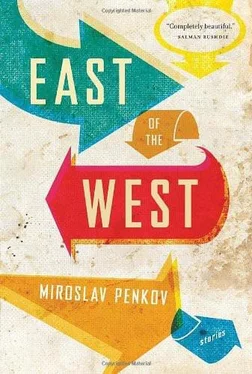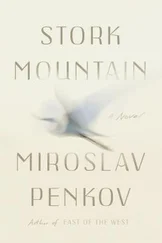My parents must have been proud to have such a studious son. But no matter how good my grades, Grandpa never brought himself to share their sentiments. He despised the West, its moral degradation and lack of values. As a child, I could read only those books he deemed appropriate. Party Secret was appropriate. Treasure Island was not. The English language, Grandpa insisted, was a rabid dog, and sometimes a single bite was all it took for its poison to reach your brain and turn it to crabapple mash. “Do you know, sinko,” Grandpa asked me once, “what it is like to have crabapple mash for brains?” I shook my head, mortified. “Read English books, my son, and find out for yourself.”
The first few years after my grandmother’s death, he stayed in his native village, close to her grave. But after Grandpa had a minor stroke, my father convinced him to come back to Sofia. He arrived at our threshold with two bags — one full of socks, pants and drawers, the other of dusty books. “An educational gift,” he said, and hung the bag over my shoulder and tousled my hair, as though I were still a child.
Every week, for a few months, he fed me a different book. Partisans, plots against the tsarist regime. “Grandpa, please,” I’d say. “I have to study.”
“What you have to do is acquire a taste.” He’d leave me to read but then would barge into my room a minute later with some weak excuse. Had I called him? Did I need help with a difficult passage?
“Grandpa, these are children’s books.”
“First children’s books, then Lenin’s.” He’d sit at the foot of my bed, and motion me to keep on reading.
If I came home from school frightened because a stray dog had chased me down the street, Grandpa would only sigh. Could I imagine Kalitko the shepherd scared of a little dog? If I complained of bullies Grandpa would shake his head. “Imagine Mitko Palauzov whining.”
“Mitko Palauzov was killed in a dugout.”
“A brave and daring boy indeed,” Grandpa would say, and pinch his nose to stop the inevitable tears.
And so one day I packed up the books and left them in his room with a note. Recycle for toilet paper . Next time he saw me, I was reading The Call of the Wild .
From then on Grandpa listened to the radio a lot, read the Communist newspaper Duma and the collected volumes of his beloved Lenin. He smoked unfiltered cigarettes on the balcony and recited passages from volume twelve to the sparrows along the TV antenna. My parents were concerned. I was truly amused. “Did you hear, Grandpa,” I asked him once, “about the giraffe who could fly?”
“Giraffes can’t fly,” he said. I told him I’d just read so in Duma , on the front page at that, and he rubbed his chin. He pulled on his mustache. “Perhaps a meter or two?” he said.
“Did you hear, Grandpa,” I kept going, “that last night in Moscow Yeltsin fed vodka to Lenin’s corpse? They killed the bottle together and, hand in hand, zigzagged along the square.”
There was something exhilarating about teasing Grandpa. On the one hand, I was ashamed, but on the other … Sometimes, of course, I went too far and he tried to smack me with his cane. “Why aren’t you five again?” he’d say. “I’d make your ears like a donkey’s.”
It was not the teasing but rather the sight of me hunched over an abridged edition of the Oxford English Dictionary that finally drove Grandpa back to his native village. When my father asked for an explanation, he could not let himself admit the real reason. “I’m tired of looking at walls,” he said instead. “I’m tired of watching the sparrows shit. I need my Balkan slopes, my river. I need to tidy your mother’s grave.” We said nothing on parting. He shook my hand.
Without Grandpa to distract me, I focused on my studies. It had become popular at that time for kids to take the SAT and try their luck abroad. Early in the spring of 1999 I got admitted to the University of Arkansas, and my scores were good enough to earn me a full scholarship, room and board, even a plane ticket.
My parents drove me to Grandpa’s village house so I could share the news with him in person. They did not believe that phones could handle important news.
“America,” Grandpa said when I told him. I could see the word dislodge itself from his acid stomach, stick in his throat and be expelled at last onto the courtyard tiles. He watched me and pulled on his mustache.
“My grandson, a capitalist,” he said. “After all I’ve been through.”
•
What Grandpa had been through was basically this:
The year was 1944. Grandpa was in his mid-twenties. His face was tough but fair. His nose was sharp. His dark eyes glowed with the spark of something new, great and profoundly world-changing. He was poor. “I,” he often told me, “would eat bread with crabapples for breakfast. Bread with crabapples for lunch. And crabapples for dinner, because by dinnertime, the bread would be gone.”
That’s why when the Communists came to his village to steal food, Grandpa joined them. They had all run to the woods where they dug out underground bunkers, and lived in them for weeks on end — day and night, down there in the dugouts. Outside, the Fascists sniffed for them, trying to hunt them down with their Alsatians, with their guns and bombs and missiles. “If you think a grave is too narrow,” Grandpa told me on one occasion, “make yourself a dugout. No, no, make yourself a dugout and get fifteen people to join you in it for a week. And get a couple pregnant women, too. And a hungry goat. Then go around telling everybody a grave is the narrowest thing on earth.”
“Old man, I never said a grave was the narrowest thing.”
“But you were thinking it.”
So finally Grandpa got too hungry to stay in the dugout and decided to strap on a shotgun and go down to the village for food. When he arrived, he found everything changed. A red flag was flapping from the church tower. The church had been shut down and turned into a meeting hall. There had been an uprising, the peasants told him, a revolution that overthrew the old regime. While Grandpa was hiding in the dugout, communism sprouted fragrant blooms. All people now walked free, and their dark eyes glowed with the spark of something new, great and profoundly world-changing. Grandpa fell to his knees and wept and kissed the soil of the motherland. Immediately, he was assimilated by the Party. Immediately, as a heroic partisan who’d suffered in a dugout, he was given a high position in the Fatherland Front. Immediately, he climbed further up the ladder and moved to the city, where he became something-something of the something-something department. He got an apartment, married Grandma; a year later my father was born.
•
I arrived in Arkansas on August 11, 1999. At the airport I was picked up by two young men and a girl, all in suits. They were from some sort of an organization that cared a whole lot for international students.
“Welcome to America,” they said in one warm, friendly voice, and their honest faces beamed. In the car they gave me a Bible.
“Do you know what this is?” the girl bellowed slowly.
“No,” I said. She seemed genuinely pleased.
“These are the deeds of our Savior. The word of our Lord.”
“Oh, Lenin’s collected works,” I said. “Which volume?”
•
My first week in America unfolded under the banner of International Orientation. I made acquaintances from countries smaller than my own. I shook hands with black people. Those of us for whom English was a second language were instructed what to expect when it was fixin’ to rain. What “yonder” meant, and how it was “a bummer” to be there “yonder” with no umbrella and it “fixin’ to rain.”
Читать дальше











